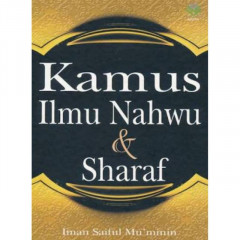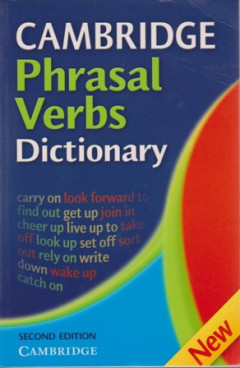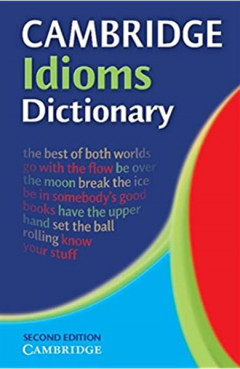Filter by

Multiple interpretaton of english utterances by the seventh semester students…
the problem statements are; how is the meaning of writer's intention? and how are the readers interpretation?.
- Edition
- -
- ISBN/ISSN
- -
- Collation
- ix, 44 pages
- Series Title
- -
- Call Number
- BSI 2004

Kamus ilmu nahwu dan sharaf
Dalam kamus ini penulis berusaha membentangkan aneka pendapat pakar nahwu, baik pandangan para pakar nahwu klasik, maupun kontemporer, dengan harapan para pembaca akan terbuka cakrawala wawasan keilmuannya tentang nahwu dan sharaf.
- Edition
- Ed. 1, Cet. 1
- ISBN/ISSN
- 9789799392732
- Collation
- xii, 340 hlm.; 24 cm
- Series Title
- -
- Call Number
- R 492.73 IMA k

Huruf “la” dan kedudukanya dalam surah Al-hujurat : analisis nahu
Skripsi ini membahas tentang huruf “La” dan kedudukanya pada surah al-hujurat (nahu). Rumusan masalah yang digunakan adalah berapa jumlah “La” dalam bahasa Arab dan bagaimana penggunaanya dalam kalimat bahasa arab. Tujuan dalam penelitian ini adalah untuk mengetahui berapa banyak huruf “La” dalam bahasa arab. Kata kunci : Bahasa Arab, Tata bahasa
- Edition
- -
- ISBN/ISSN
- -
- Collation
- x, 59 hlm.; ilus.: 28 cm.
- Series Title
- -
- Call Number
- SKR/BSA/2009 492.7 HAM h

Factors influence the last semester students of english and literature depart…
basic on the finding and discussion in this thesis, the writer found that the most important factor influence be succeed in speaking ability was high motivation to speak was 36%%, the most important factor influence to fail in speaking ability was lack of self-esteem in speaking was also 36%. meanwhile, factors that influence students to succeed in speaking ability were: intrinsic motivation wa…
- Edition
- -
- ISBN/ISSN
- -
- Collation
- xi, 49 hlm ; 27 cm.
- Series Title
- -
- Call Number
- BSI 2012 RIN f

Errors made by the students in using prepositions in the sentences : a case s…
the result of this research has shown that the first class of madrasah aliyah al-hidayah had low ability in using of preposition in the sentence, it can be proved from the result of the test in which 55,92% students answered errors and only 44,09% students answered correctly it is classified as less category.
- Edition
- -
- ISBN/ISSN
- -
- Collation
- ix, 39 hlm ; 27 cm.
- Series Title
- -
- Call Number
- BSI 2005 RUB e

Oxford advanced learner's dictionary of current English
- Edition
- -
- ISBN/ISSN
- 0194314243
- Collation
- xiv, 1600 hlm.: ilus.; 22 cm
- Series Title
- -
- Call Number
- 420 HOR o
- Edition
- -
- ISBN/ISSN
- 0194314243
- Collation
- xiv, 1600 hlm.: ilus.; 22 cm
- Series Title
- -
- Call Number
- 420 HOR o

Cambridge phrasal verbs dictionary
Kamus ini memiliki enam ribu phrasal verbs, seribu contoh kalimat berbasis Cambridge International Corpus dilengkapi gambar, lembar kerja, penggunaan bahasa Inggris, penjelasan grammar, dan menunjukkan phrasal verbs yang penting untuk dipelajari.
- Edition
- 2nd ed,
- ISBN/ISSN
- 9780521860383
- Collation
- xiii, 377 hlm.: ilus.; 20 cm.
- Series Title
- -
- Call Number
- R 423 CAM c

Cambridge idioms dictionary
- Edition
- -
- ISBN/ISSN
- 9780521677691
- Collation
- xv, 505 hlm.; 20 cm.
- Series Title
- -
- Call Number
- R 423.313 CAM c
- Edition
- -
- ISBN/ISSN
- 9780521677691
- Collation
- xv, 505 hlm.; 20 cm.
- Series Title
- -
- Call Number
- R 423.313 CAM c

Difficulties in developing ideas in essay writing encountered by the seventh …
- Edition
- -
- ISBN/ISSN
- -
- Collation
- x, 68 hlm.; 27 cm
- Series Title
- -
- Call Number
- BSI 2009 SUD d
- Edition
- -
- ISBN/ISSN
- -
- Collation
- x, 68 hlm.; 27 cm
- Series Title
- -
- Call Number
- BSI 2009 SUD d

Difficulties faced by students in using coordinate conjunction in english (a …
based on findings and discussion in this thesis, the researcher found that the difficulties of students to use coordinate conjunction is classified fair. their diffuclties are mostly distinguishing kinds of conjunction, confuse of the explanation from the lecturer, do not have guide book, do not know to put coordinate conjunction between dependent and independent clause, difficulty to distingui…
- Edition
- -
- ISBN/ISSN
- -
- Collation
- xii, 75 pages
- Series Title
- -
- Call Number
- BSI 2013
 Computer Science, Information & General Works
Computer Science, Information & General Works  Philosophy & Psychology
Philosophy & Psychology  Religion
Religion  Social Sciences
Social Sciences  Language
Language  Pure Science
Pure Science  Applied Sciences
Applied Sciences  Art & Recreation
Art & Recreation  Literature
Literature  History & Geography
History & Geography